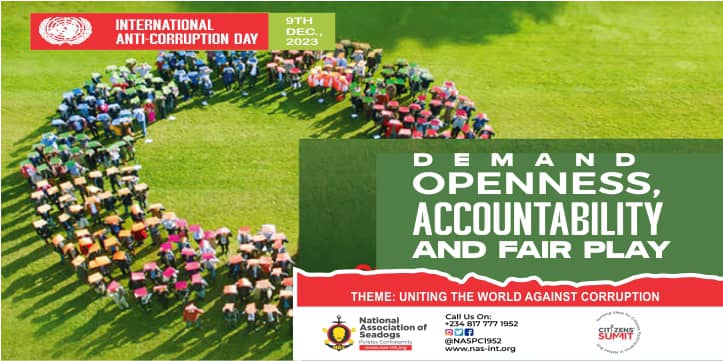On 31st October 2003, the United Nations General Assembly adopted the Convention against corruption and established the International Anti-corruption Day to boost worldwide awareness of the deleterious impacts of corruption, and to galvanise consistent international resolve to confront it.
However, corruption has remained a hydra-headed phenomenon whose inimical consequences traverse political and socio economic spectrums. Its far-reaching effects sabotage democratic institutions, frustrate economic development, trigger poverty and engender governmental instability. The erosion of the essence of democracy by corruption finds some of its hideous expressions in the brazen manipulation of electoral processes, the upending of the enduring tenets of the rule of law, and a methodical encouragement of the concept of bribery.
On this auspicious day marking International Anti-corruption Day, the National Association of Seadogs Pyrates Confraternity, NAS/PC rallies with the rest of the world under the theme – Uniting the World Against Corruption. The theme for this year’s commemoration is a well thought out response to the enormous challenges facing humanity; challenges most of which have wanton corruption as their most recurring feature. The role of corruption in conflict and instability cannot be overstated. Either as a cause or a consequence, corruption continues to entrench anomalous occurrences such as conflicts, while dismantling the bulwarks of peace and stability. The theme is, therefore, intended to call attention to the important, often-overlooked intersection between the war against corruption and the attainment of lasting peace, security, and development.
Corruption remains a formidable barrier to Nigeria’s growth and development. In spite of effusive official proclamations of a resolve to tackle the scourge, the prevalence of corrupt practices in Nigerian society continues to undermine the nation’s potential for progress and prosperity. Transparency International’s January 2023 Corruption Perception Index ranked Nigeria 150th among the 180 countries in the index, with the most corrupt public sector tag to boot. The Open Society Foundations, in its September 2023 report, blamed pervasive corruption for the unfortunate state of democracy in the country. Among other groups that have bemoaned the tragic consequences of corruption in Nigeria is the US-based Center for International Private Enterprise which put the matter squarely at the government’s feet for being “selective, ineffective, and themselves lacking credibility”. Foremost professional services firm Price Waterhouse Coopers (PWC) has repeatedly stated that by 2030, corruption would have eroded 37% of Nigeria’s GDP if not aggressively addressed.
NAS/PC is gravely disturbed that at a time of unprecedented economic downturn, with endemic corruption still maintaining a chokehold on the country, government officials are carrying on as if all is normal. At a time that government policies have continued to migrate more and more of our compatriots into the very nadir of human existence, worrisome news of official budgetary provisions for the most unnecessary material expenditure for government officials at the highest level persist, even as they fly in the face of morality and common sense!
We believe that the fight against corruption should start from a frugal Federal Government setting the tone for the rest of the country with exemplary conduct. It is imperative for government officials to adopt frugal belt-tightening measures. The nation’s economic stability hinges on responsible financial management and judicious use of public funds. Frugality is not merely a buzzword; it is a pragmatic approach to navigating challenging economic times. Government officials must lead by example, demonstrating a commitment to fiscal responsibility and transparency.
We condemn the mismanagement of resources that not only perpetuates corruption but also hampers the country’s ability to address critical issues such as infrastructure development and social welfare. Government must deliberately identify and eliminate unnecessary expenses. A thorough review of budgets can reveal areas where funds are misallocated or spent extravagantly. This includes scrutinising travel expenses, allowances, and non-essential expenditures.
More importantly, we also need to stress that the endemic nature of corruption has permeated the very fabric of Nigerian society. The way and manner, some Nigerians consider corruption as a way of life, encourages and celebrates it is unacceptable. The seemingly lack of consequences and its pervasive nature embraced by some Nigerians is depressing, forcing more Nigerians to leave the country to other places where corruption is fought headlong.
As the world marks International Anti-Corruption Day, we call on the Nigerian government to take decisive actions to curb corruption, institute reforms, and foster a culture of accountability. We urge government ministries, departments, and agencies to prioritise transparency, accountability, and ethical governance. The citizens deserve a government that prioritises their well-being over personal interests. We urge Nigerians to stop promoting and celebrating corruption in any form.
We reiterate our commitment to promoting a corruption-free society. By uniting against corruption, we can build a Nigeria that thrives on transparency, fairness, and the responsible stewardship of resources.
Abiola Owoaje
NAS Capoon
Abuja



![[PRESS RELEASE] AFFIRMATION OF EMERGENCY RULE IN RIVERS STATE THROUGH “AYES AND NAYS”](https://www.nas-int.org/wp-content/uploads/2025/03/National-Assembly-Ayes-and-Nays-400x250.jpeg)
